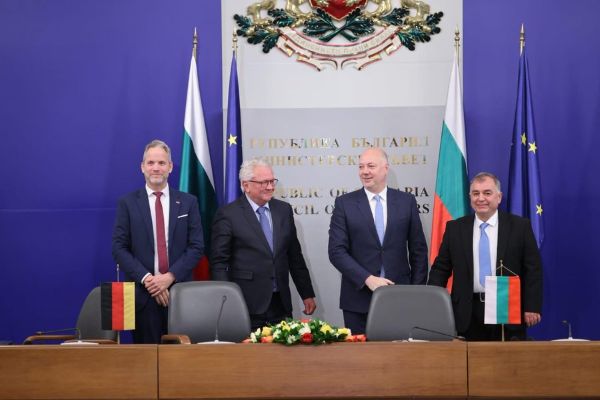German defence company Rheinmetall and Bulgarian company VMZ (Vazovski Mashinostroitelni Zavodi) agreed to establish a joint venture to develop and manufacture artillery shells and energetic materials. The sides signed an agreement today. This initiative aligns with the EU’s strategic efforts to enhance its defence capabilities in the wake of Russia’s invasion of Ukraine.
The total investment in the joint venture amounts to approximately €1 billion – one of the most significant investments in ammunition production in recent years. Rheinmetall will retain a 51% ownership stake, while Bulgaria will fund its share through loans under the European SAFE mechanism.
The production facility will cover approximately 100 hectares. The site is located in the Sopot region of Bulgaria. The joint venture is expected to create around 1,000 high-skilled jobs, making it one of the most significant industrial projects in Bulgaria in recent years. Annual production capacity will be around 100,000 shells and propellant charges, with the capacity to produce up to 150,000 shells. In addition, the joint venture will produce approximately 1,300 tonnes of propellant powder. This capacity will support VMZ’s business. According to current plans, production of projectile casings is scheduled to begin in 2027. Energetic materials are to be produced from 2028 onwards.
“We are grateful for the Bulgarian government’s confidence in our capabilities,” said Armin Papperger, CEO of Rheinmetall AG. “With the new production facility, we are further expanding our leading role as a manufacturer of artillery ammunition to continue supporting the defence capabilities of the European Union and NATO.”
Rheinmetall CEO emphasised that the facility could be operational within 14 months. As a member of both the European Union and NATO, Bulgaria recognises this project as a vital component in fortifying defence production and supply chains.
Prime Minister Rosen Zhelyazkov highlighted that this agreement represents a substantial advancement in Bulgaria’s industrial and defence capabilities. Historically, Bulgaria was a significant arms producer within the former Soviet bloc during the Cold War, specialising in small arms, ammunition, and light armoured vehicles. However, the dissolution of the Warsaw Pact led to a considerable decline in this sector, resulting in the closure of numerous state-owned factories.
The ongoing conflict in Ukraine has reinvigorated interest in Bulgaria’s arms production, positioning the nation as a crucial supplier of ammunition to Kyiv.
This article used information from The Associated Press

